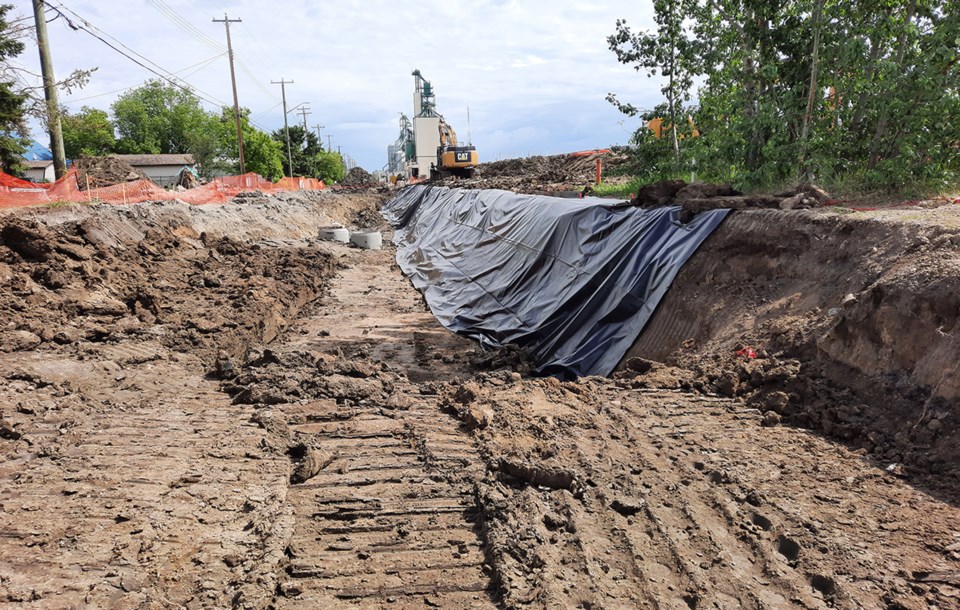WESTLOCK – Imperial Oil, the corporate owner of the decommissioned bulk fuel station blamed for “heavy concentrations of hydrocarbons” found during the $7.3-million 108th Street reconstruction project in Westlock, say they’ll continue to monitor the property, but remediation plans for the site “are yet to be determined.”
Imperial public and government affairs manager Keri Scobie said via e-mail July 7 that their environmental consultants have conducted site assessments over the years and the data collected to date “does not indicate a risk to public health and safety, or the environment associated with Imperial’s past operations.” She went on to say they’ve shared the results from the roadway with the Town of Westlock annually for about a decade.
Alberta Environment and Parks confirmed a similar assessment regarding risk to residences in the Whissellville area, stating in a July 5 e-mail that contamination limits have been defined on the north side of the roadway and “are not expected to cause concern or issue to nearby residential properties” and that they’ll “work with Imperial Oil to ensure the contamination is appropriately managed until remediated.”
“Yes, we have defined the limits of the hydrocarbon impacts toward nearby residences and the data collected doesn’t indicate there is a risk. We continue to work closely with AEP,” said Scobie. “Imperial takes our involvement with the utility upgrade work seriously and have worked collaboratively with the Town of Westlock from the time we were first contacted in May.”
The former bulk fuel facility, which was decommissioned in 1987, was located on a 300-by-94-foot lot on the southern side of 108th Street in Whissellville, about two lots west of where 98th Avenue begins. The site included an office, tanks and a warehouse — Imperial eventually bought the land in 1997 after previously leasing it. The north side of 108th Street, heading east from 97th Avenue to 98th Avenue, includes an apartment building, plus the backyards of homes, while the CN Rail line runs parallel to the entire length of 108th Street.
What lies below?
Imperial doesn’t have a timetable for reclaiming the site and as for specifics on what was found in the soil, neither AEP, or Imperial has elaborated further, with Scobie saying their consultants sampled the ground within the utility corridor in proximity to their property and “any soil that did not meet Alberta’s standard was disposed of at an approved disposal facility at Imperial’s cost.”
While a 2018 groundwater monitoring and sampling report provided by AEP notes elevated levels of Benzene at at least two groundwater sampling bore holes on Imperial’s land, Scobie said that since the site is vacant they have “no concerns related to Benzene on the property.”
According to the same report other chemicals tested for and found on and around the site within acceptable AEP limits included Toluene, Ethylbenzene and Xylenes.
“We will continue to appropriately manage and monitor the site until we remediate. The remediation timelines are still to be determined,” said Scobie.
Benzene is a clear, colourless-to-light yellow flammable liquid that has a sweet, aromatic smell and is a volatile hydrocarbon made mostly from petroleum. It is considered a toxic substance by the Canadian federal government and is a known carcinogen. Exposure mainly occurs through breathing air that contains it — the major sources of Benzene exposure are tobacco smoke, exhaust from motor vehicles and industrial emissions.
Vapours from products that contain it, such as glues, paints, furniture wax, and detergents, can also be a source of exposure.
In her briefing to Town of Westlock council June 28, CAO Simone Wiley said “heavy concentrations of hydrocarbons” were found on 108th Street, but noted that construction crews have since continued east and have yet to encounter any more contaminated soil.
The final bill
At that same council meeting, councillors voted 7-0 to amend the municipality’s 2021 capital budget, adding $1.6 million for remediation costs for the stretch — the town is fronting the clean-up bill and has invoiced Imperial Oil $782,498.31 so far.
Due to the remediation, reconstruction of 108th Street, which includes a fresh asphalt overlay, new curbs, gutters and sidewalks, as well as a new storm sewer line, sanitary sewer line and sanitary water line, is about two months behind schedule.
MPE Engineering Ltd., the town’s engineering firm, estimates the clean-up job will cost $1.6 million, while Scobie says they don’t expect the bill to get that high, but they’ll “continue to work closely with the town to determine the final remediation bill.”
The clean-up, which was done by the town’s contractor, Knelsen Sand & Gravel, included the removal of contaminated materials to the Roseridge Waste Management in Morinville and the installation of a plastic underground liner to contain further seepage from the site. Remediation started at the end of May and wrapped before July 1.
Scobie went on to the note that within a day of learning of the field crew’s discovery of “hydrocarbon odours” on 108th, Imperial proactively arranged to meet with the town.
“During that meeting, Imperial established that it would assist the town with their project and would reimburse the town for incremental remediation costs associated with the utility upgrades in proximity to the Imperial site,” Scobie said.
“Imperial and our environmental consultants were involved daily and regularly on site assisting the town throughout this period.”
Wiley offered a slightly different version at council’s June 28 meeting, stating they had contacted Imperial prior to the start of the project in April as they thought there was a high possibility they’d encounter something and were told, ‘Call us when you find something.’
Wiley did confirm that during the process there was extensive communication with Imperial Oil, AEP and MPE Engineering, with environmental consultants from both Imperial and MPE on site.


